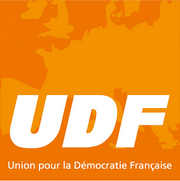Union for French Democracy Union pour la démocratie française | |
|---|---|
 | |
| Abbreviation | UDF |
| Leaders | |
| Founder | Valéry Giscard d'Estaing |
| Founded |
|
| Dissolved | 30 November 2007 (de facto)[a] |
| Merger of | |
| Succeeded by | |
| Headquarters | UDF 133 bis, rue de l'Université 75007 Paris |
| Ideology | |
| Political position | Centre-right |
| European affiliation | European People's Party (1994–2004)[1] European Democratic Party[2] (2004–07) |
| European Parliament group | |
| International affiliation | None |
| Colours | |
| Website | |
| www.udf.org (inactive) | |
The Union for French Democracy (French: Union pour la démocratie française, UDF) was a centre-right political party in France. The UDF was founded in 1978 as an electoral alliance to support President Valéry Giscard d'Estaing in order to counterbalance the Gaullist preponderance over the political right in France. This name was chosen due to the title of Giscard d'Estaing's 1976 book, Démocratie française.
The founding parties of the UDF were Giscard's Republican Party (PR), the Centre of Social Democrats (CDS), the Radical Party (Rad.), the Social Democratic Party (PSD) and the Perspectives and Realities Clubs (CPR). The UDF was most frequently a junior partner in coalitions with the Gaullist Rally for the Republic (RPR) and its successor party, the Union for a Popular Movement (UMP). Prior to its dissolution, the UDF became a single entity, due to the defection of Republicans, Radicals and most Christian Democrats to the UMP and the merger of the other centrist components. The UDF effectively ceased to exist by the end of 2007, and its membership and assets were transferred to its successor party, the Democratic Movement (MoDem). The UDF's final leader was François Bayrou, who transferred his leadership to MoDem.
Cite error: There are <ref group=lower-alpha> tags or {{efn}} templates on this page, but the references will not show without a {{reflist|group=lower-alpha}} template or {{notelist}} template (see the help page).
- ^ Thomas Jansen; Steven Van Hecke (2011). At Europe's Service: The Origins and Evolution of the European People's Party. Springer Science & Business Media. p. 51. ISBN 978-3-642-19414-6.
- ^ Nordsieck, Wolfram (2007). "France". Parties and Elections in Europe. Archived from the original on 28 April 2007. Retrieved 17 March 2019.